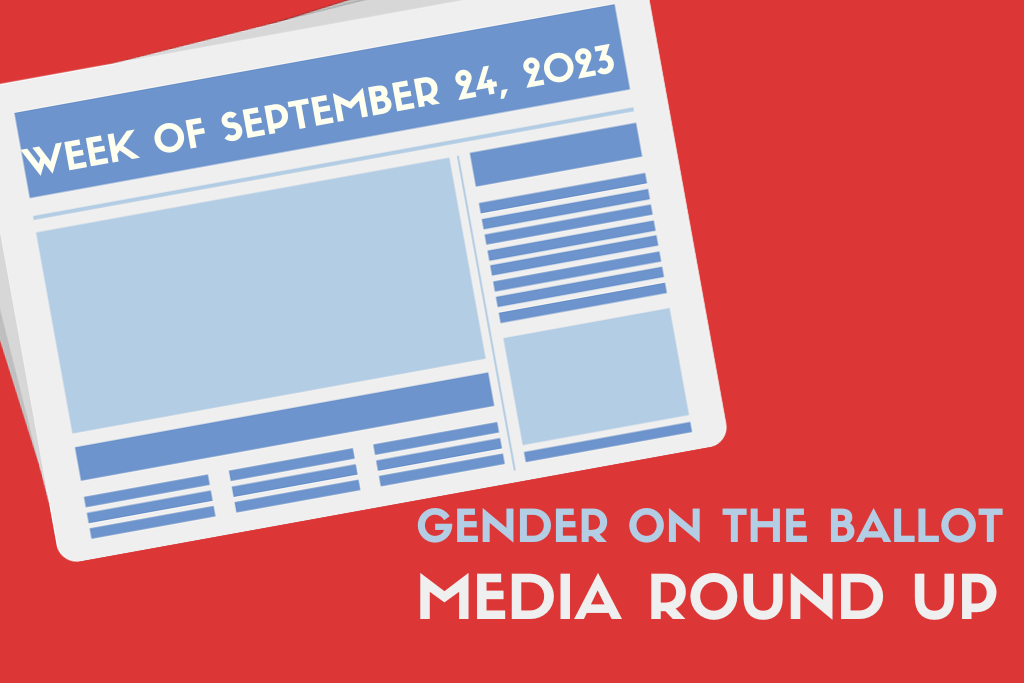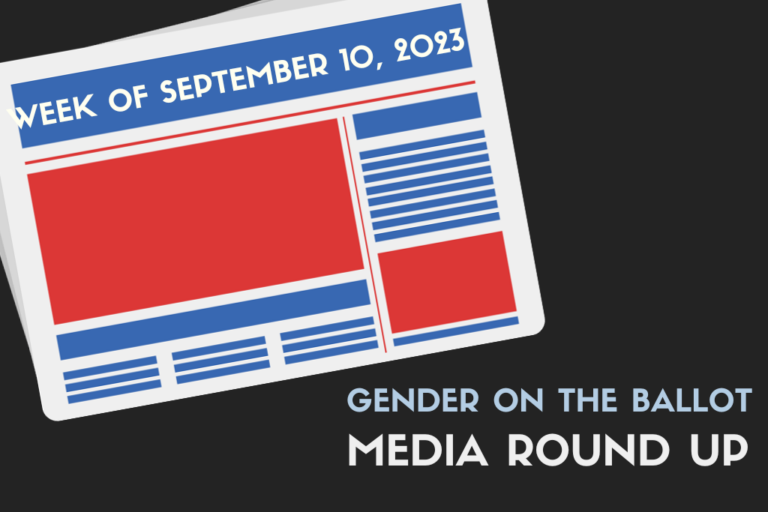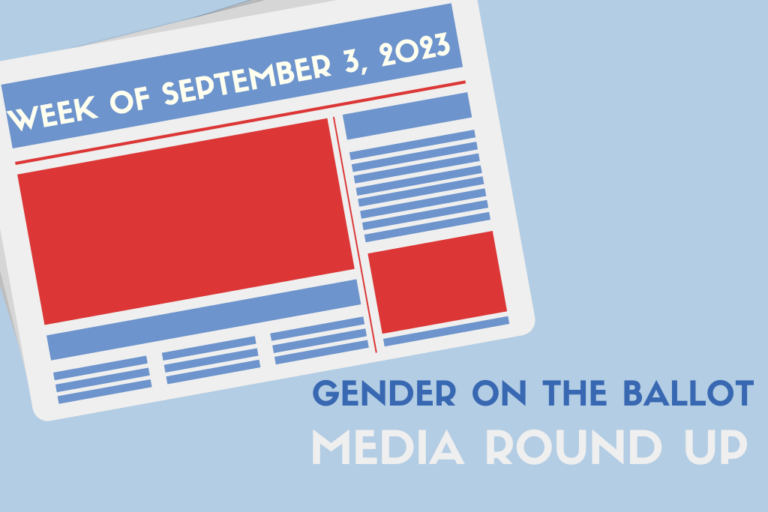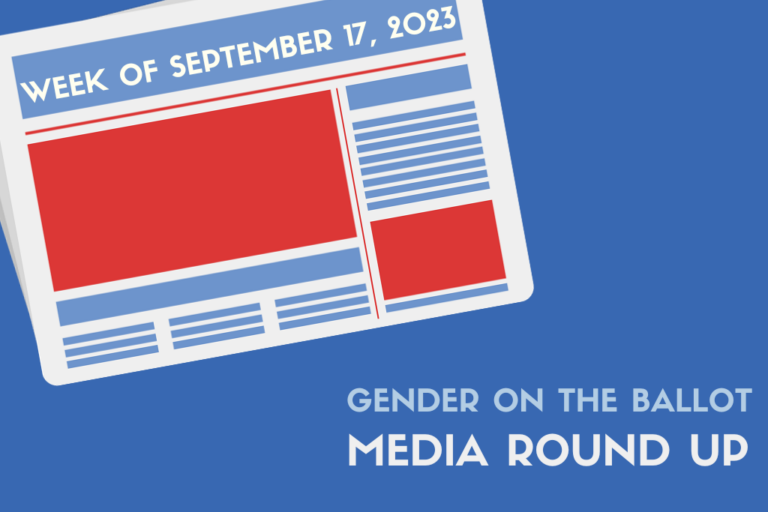Happy Friday! Welcome to our Media Round Up. Each week, we’re collecting and sharing…
Media Round-Up: Week of September 24, 2023

Happy Friday! Welcome to our Media Round Up. Each week, we’re collecting and sharing gender + politics stories. Here’s what caught our eye this week:
Dianne Feinstein defied the odds in a field perpetually dominated by men
Jerry Roberts, Washington Post
Dianne Feinstein, the longest serving woman Senator, oldest member of the Senate, and longest-serving senator of California has passed away at the age of 90. Feinstein was also the first female elected mayor of San Francisco. Senator Feinstein announced in February that she had planned on retiring at the end of her term. During her trailblazing career, Feinstein was a strong advocate for gun control, served as chairwoman of the Senate Intelligence Committee, and frequently found common ground between Republicans and Democrats as a centrist Democrat.
Read the full story here.
As Haley and Ramaswamy Rise, Some Indian Americans Have Mixed Feelings
Jazmine Ulloa, New York Times
While excited at the fact that there are two Indian Americans – Nikki Haley and Vivek Ramaswamy – as serious presidential contenders who regularly speak on their parents’ immigrant roots, some Indian Americans are struggling to celebrate the moment due to the Republican hopeful’s deeply conservative views. Suresh Reddy, a centrist Democrat and city councilman from the suburbs of Des Moines, Iowa, said, “I’m really proud … I just wish they had a better message.” In many Indian American homes and places of worship across the country, many described Haley and Ramaswamy’s rise as a political triumph, with Indian Americans becoming more visible in fields beyond medicine, tech, and engineering.
Read the full story here.
Women Lawmakers Have Pushed Back Against Senate Dress Codes for Decades
Einav Rabinovitch-Fox, Ms. Magazine
Last week, Senate Majority Leader Senator Chuck Schumer (D-N.Y.) announced that, “Senators are able to choose what they wear on the Senate floor.” This announcement was seen as a major change, especially for an establishment known for following tradition and what some would call “archaic protocols.” Some welcomed the change, while others have expressed their disdain for it, saying that the loosening of the dress code is another step in degrading the institution. The need for specifics regarding dress code first became pertinent when politicians and the dealings of Congress became more public. At first, these dress codes did not include women; however, over time, as the number of women in Congress increased, women have found themselves at the forefront of the push back against the Senate’s dress code.
Read the full story here.
Women pay billions more out of pocket for health care: analysis
Tina Reed, Axios
According to a new report from Deloitte, at every age, women have higher out-of-pocket expenses for their healthcare than men, despite having similar health insurance. In recent years, awareness of the “pink-tax” has increased, considering that women’s consumer products have a higher cost. The new analysis from Deloitte argues women have a similar burden when it comes to their health coverage. Of more than 16 million people who have employer-sponsored coverage, even when maternity care is removed, each year women are paying $15.4 billion more out of pocket for health care. Even accounting for women using health care more often, they still experience out-of-pocket expenditures that were 18% higher. Some of the reasons for this that the authors found included different kinds of care recommended for women like annual checkups and gynecological examinations, and costs for breast cancer imaging compared to screening for other cancer types.
Read the full story here.
U.S. history classes are mostly about men. Two teachers are looking to change that.
Nadra Nittle, The 19th*
A decade ago, after struggling to find a high school textbook that contained meaningful contributions to society from women, Sacred Heart Preparatory teacher Kristen Kelly asked herself, “How can young women really see their value if they don’t see their place in history?” Kelly then expressed her feelings to Sacred Heart history teacher Serene Williams and learned that she had similar frustrations. After this realization, the two teamed up and created a reader to accompany coursework of an interdisciplinary women’s history class they developed. Now, a decade later, the two women are on a mission to establish a legacy of women in high school history courses across the country. They are petitioning the College Board to offer an AP U.S. Women’s History course. So far, they have 2,000 signatures collected.
Read the full story here.
Nikki Haley skewers opponents in second GOP primary debate
Meryl Kornfield, Washington Post
Republican presidential nominee Nikki Haley gave a scorching debate performance on Wednesday. After the first debate, Haley climbed up some polls, but she is still trailing behind former President Donald Trump by double digits. During the debate, Haley tangled with nearly all the other candidates on stage: she critiqued Senator Tim Scott for his government spending, Florida Governor Ron DeSantis for his record against fracking, and Vivek Ramaswamy for his flip-flop stance on TikTok. Most notably, Haley held back on criticisms of Trump.
Read the full story here.







